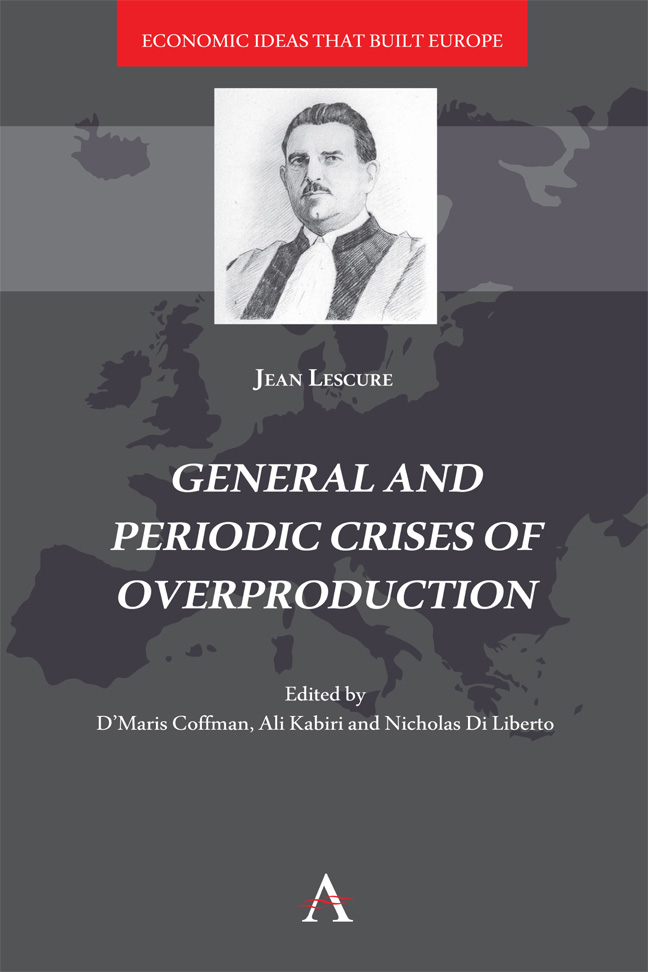Book contents
- Frontmatter
- Contents
- Acknowledgements
- Introduction: Jean Lescure on the Role of Solidarité in Industrial Economies and Among the Social Sciences
- Translator's Note
- General and Periodic Crises of Overproduction
- List of Figures
- List of Tables
- Preface to the Third Edition
- Preface to the Fourth Edition
- Preface to the Fifth Edition
- Volume One The Phenomenon
- Volume Two Causes and Remedies
- Conclusion
- Annexes
- Appendix One Bibliography of the Works Cited by Jean Lescure
- Appendix Two Bibliography of the Works of Jean Lescure
- Index
Preface to the Third Edition
Published online by Cambridge University Press: 01 March 2024
- Frontmatter
- Contents
- Acknowledgements
- Introduction: Jean Lescure on the Role of Solidarité in Industrial Economies and Among the Social Sciences
- Translator's Note
- General and Periodic Crises of Overproduction
- List of Figures
- List of Tables
- Preface to the Third Edition
- Preface to the Fourth Edition
- Preface to the Fifth Edition
- Volume One The Phenomenon
- Volume Two Causes and Remedies
- Conclusion
- Annexes
- Appendix One Bibliography of the Works Cited by Jean Lescure
- Appendix Two Bibliography of the Works of Jean Lescure
- Index
Summary
For the past twenty years, the problem of periodic crises has retained the special attention of economists. Many works have been published and official commissions named. A price research service – a kind of observatory for the economic world – has been created by the Statistique générale de France. Thanks to the concerted efforts of science and administration, the analysis of the curious periodic mechanism that characterizes our modern societies has gained in detail and precision.
From here on, the crisis appears as a point in the evolution of capitalist society. In order to understand it, one must study the period of growth that precedes it and the period of depression that follows. And the study of crises is concerned with alternating periods of prosperity and depression, with the crisis placed at the junction of the two – so much so that one speaks of economic cycles in the United States and of industrial fluctuations in England when identifying the phenomenon we seek to study here.
Points of view have changed, and horizons have broadened. The entire economic system is influenced by these pendulum swings [balancement]. During the growth period, the production of goods, consumption and credit develop; incomes (wages, dividends, interest) rise. Unemployment diminishes or even disappears. Savings increase. Prices rise. After a number of years (three to five), we note an inversion in the curves. It is a drop all down the line: production, consumption and incomes sag; unemployment reappears. Business prosperity is followed by stagnation.
Not only is the entire economic organism affected, but the crisis also reaches nearly every other country; an ever-closer economic interdependency [solidarité] unites the economic markets, transforming the crisis into an international or global phenomenon. The most recent crises, in 1907, 1913 and 1920, have been global. And now the observations are numerous and precise enough and cover a sufficiently long period of time (almost a century) for there to be no appreciable divergence of opinion among economists about the phenomenon itself or about its scope. This consensus allows us to affirm the scientific nature of these observations.
Yet, after having established the phenomenon, one is tempted to search for its causes. Herein lies the disagreement. For some economists, these cycles [alternatives] may occur because production is sometimes lower and sometimes greater in relation to demand. If supply falls below demand, prices rise and with them profits. New businesses are created.
- Type
- Chapter
- Information
- General and Periodic Crises of Overproduction , pp. 51 - 54Publisher: Anthem PressPrint publication year: 2023



